Madness in Art: A Powerful Connection
Madness and art have long shared a profound and powerful connection, where the boundaries between genius and instability often blur. Many acclaimed...
Maya M. Tola 28 October 2024
Getting a tattoo is a serious business. These days you can get them removed, but that can be more painful than getting one in the first place. So, it would seem like a good idea to get a design you would like for the rest of your life. If you are reading this, there are chances that you like art. Why not have your favorite piece always with you? An artsy tattoo is for life! DailyArt Magazine is here to help you find inspiration in the pieces below. We will take a look at the classics.
In the early 16th century, Albrecht Dürer created the pen and ink drawing we know as Praying Hands or Betende Hände in German. The drawing is on blue paper that Dürer made himself. It was believed for many centuries to have been a preparatory drawing for part of an altarpiece known as the Heller Altar that was a commission by Jakob Heller. However, the chief curator of Vienna’s Albertina, Christof Metzger, proposes an alternative theory. Based on his research Metzger claims that the drawing was part of a campaign by the artist to promote his technical talents to potential patrons. The detail is extraordinary, and one can believe this theory, that an artist would not put so much time into something considered relatively peripheral to his main focus.
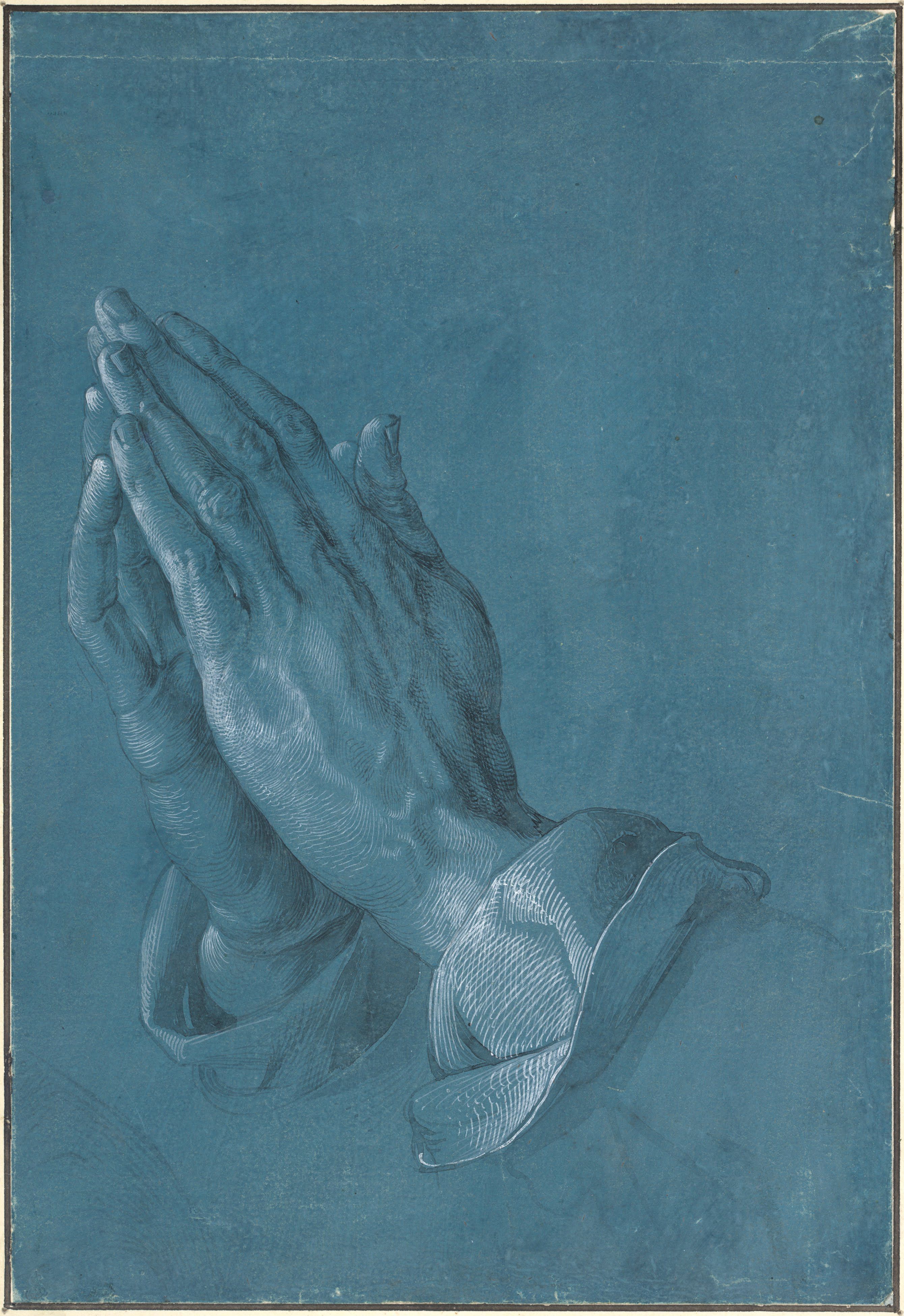
Let’s start with a design that made the news at the end of last year. Praying Hands by Albrecht Dürer. Selena Gomez got this design tattooed by Bang Bang.

Below you can see another take on the design by Ivan Casabo.
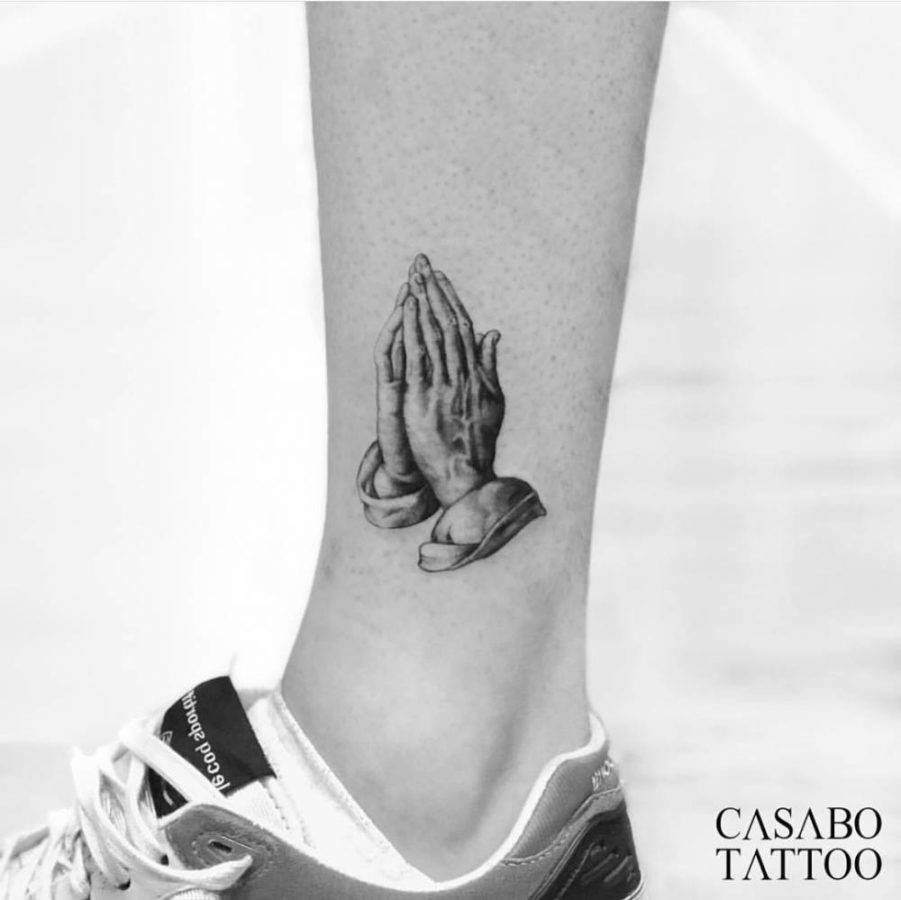
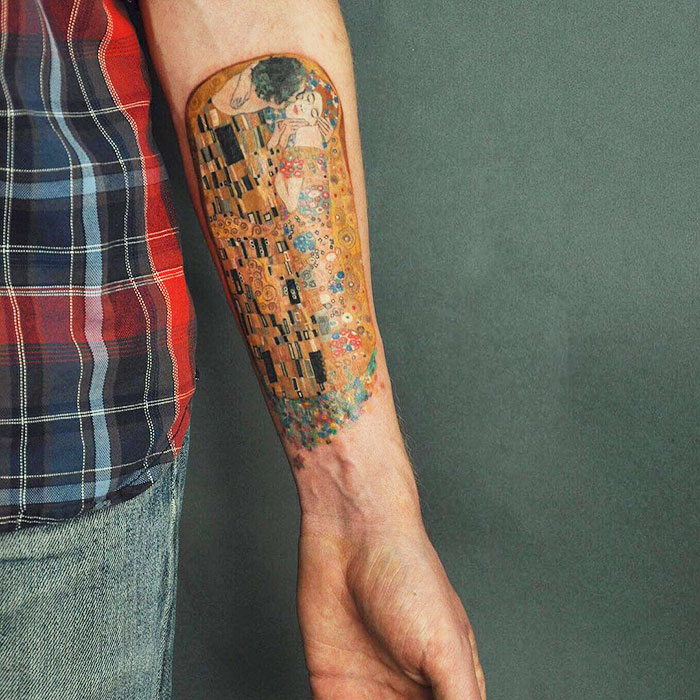
Gustav Klimt is a tattooist’s darling. While doing research for this piece I came across multiple designs based on Klimt’s work. Maybe his art renders itself conversion into tattoos thanks to its linear nature. As much as we are focused here on artsy inspirations in tattoos, tattooists draw inspiration from everywhere. Rita Zolotukhina is a prime example, nature being her main inspiration. She specializes in what you might call botanical tattoos.

Klimt created The Kiss at the peak of his Golden Period in which he drew inspiration from the Byzantine period and mosaics he saw in Ravenna. At the time, The Kiss was considered by the public to be pornographic, despite both figures being fully clothed. Nonetheless, the Belvedere Museum in Vienna chose to acquire the painting before he completed it. The painting combines Klimt’s various inspirations. Starting with the aforementioned Byzantine period, through Japanese prints, and the Arts & Crafts Movement. They all blend seamlessly together thanks to Klimt’s mastery and imagination.
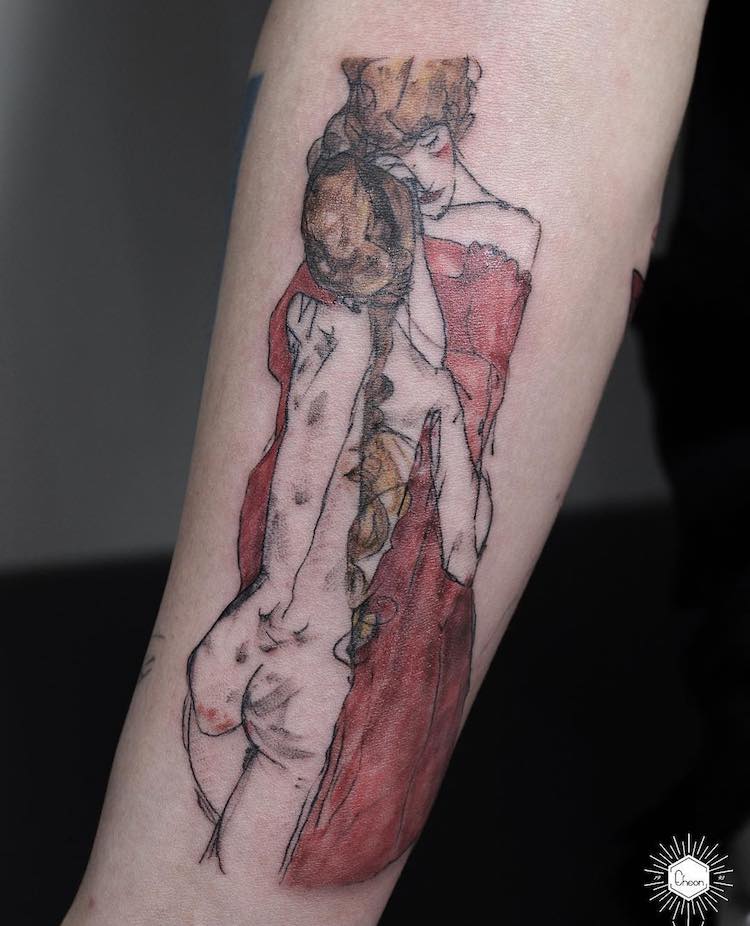
Eheon often seeks inspiration in art and by looking at his Instagram it seems Egon Schiele is one of his main muses. This is interesting as Schiele’s art is far from the simple idea of beauty that we associate with harmony and balance. Quite the opposite, Schiele’s art is the embodiment of anxiety, exaggeration, and suffering.
Klimt was Schiele’s mentor, which you may find surprising given how different their styles and ideals were. Klimt, however, was happy to mentor young artists. Also, since he was judged by society for supposedly pornographic elements in his art he could easily sympathize with Schiele’s predicament. He supported Schiele not only through mentoring. He also bought Schiele’s drawings, arranged models for him, and introduced him to potential patrons.

Mother and Daughter show us the raw emotions between the two. Their embrace was strong and close, but also a little off-balance as if the daughter threw herself into her mother’s arms to find protection. The red dress feels reassuring as if the strong warm color could protect us. The mother’s head leans in an immortal gesture of the mother caressing her child and breathing in its smell.
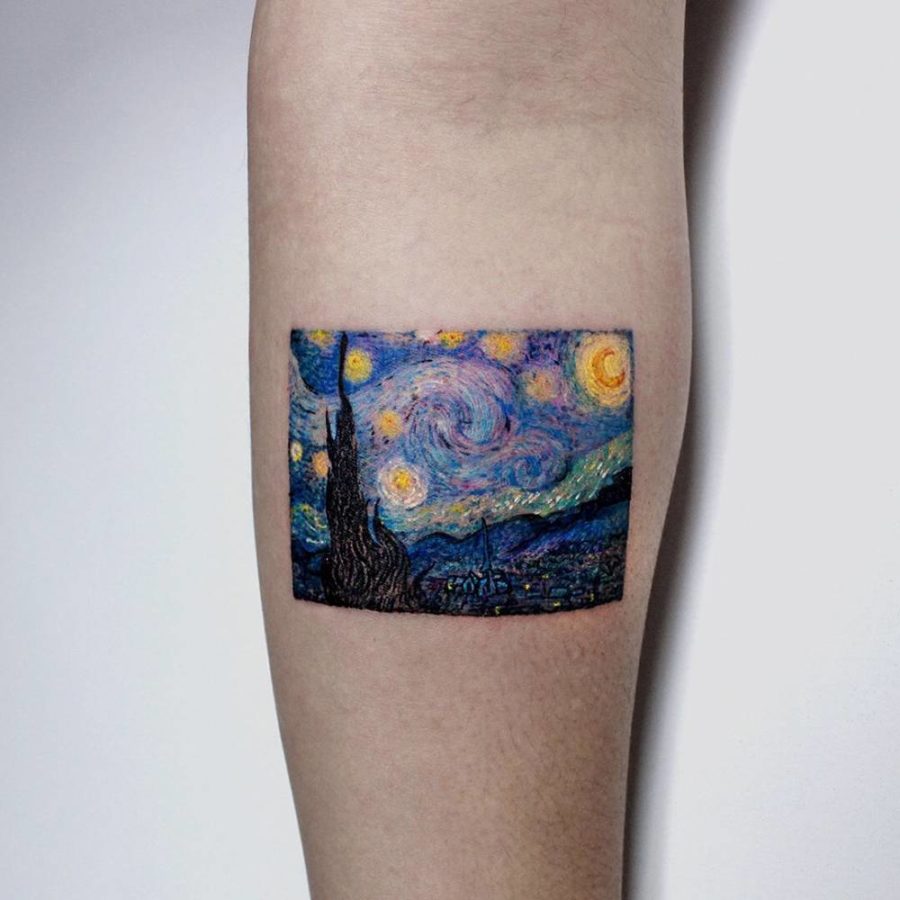
Dear Vincent is another tattoo darling, this time I think more of clients than tattoo artists. The number of tattooed Starry Night is staggering! I picked this one by J. Hyeon, purely for the level of detail.

Vincent van Gogh painted Starry Night in 1889 during his stay at the asylum of Saint-Paul-de-Mausole near Saint-Rémy-de-Provence. Initially, his state was improving, but unfortunately, he later relapsed. His darker mood is reflected in his art, particularly in the use of darker colors, instead of sunny yellows. The interesting thing is that Starry Night is an imaginary landscape. None of the scenery matches the area surrounding Saint Paul or the view from his window. For a man who religiously painted what he saw, it’s a remarkable break from Van Gogh’s typical approach.
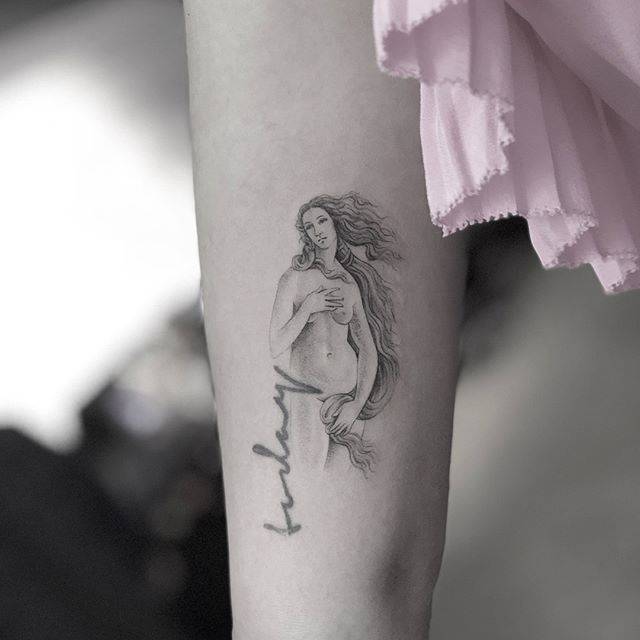
Let’s jump a little further into the past. Botticelli’s paintings seem to be quite popular with women. I think due to their graphic nature they are also easily converted into tattoos. His precise, graceful lines evoke the classical ideals of beauty. Here you can see Mr. K’s take on this topic. Mr. K, apart from tattooing many celebrities, also from time to time decides to tattoo an odd Louis Vuitton bag.
Sandro Botticelli was not named Sandro Botticelli. You can easily figure out that Sandro is a shortened version of Alessandro. But what about the Botticelli? It was a nickname given to him by his brother. Botticello in Italian means a small barrel-shaped crystal vase. How sweet of a brother to call his sibling a tiny barrel!

The nice thing about Botticelli is that you can see most of his iconic paintings in one place. So if you are a fan head straight for the Uffizi in Florence. There you can see the Birth of Venus and the Primavera side by side, with some Madonnas thrown in for good measure.
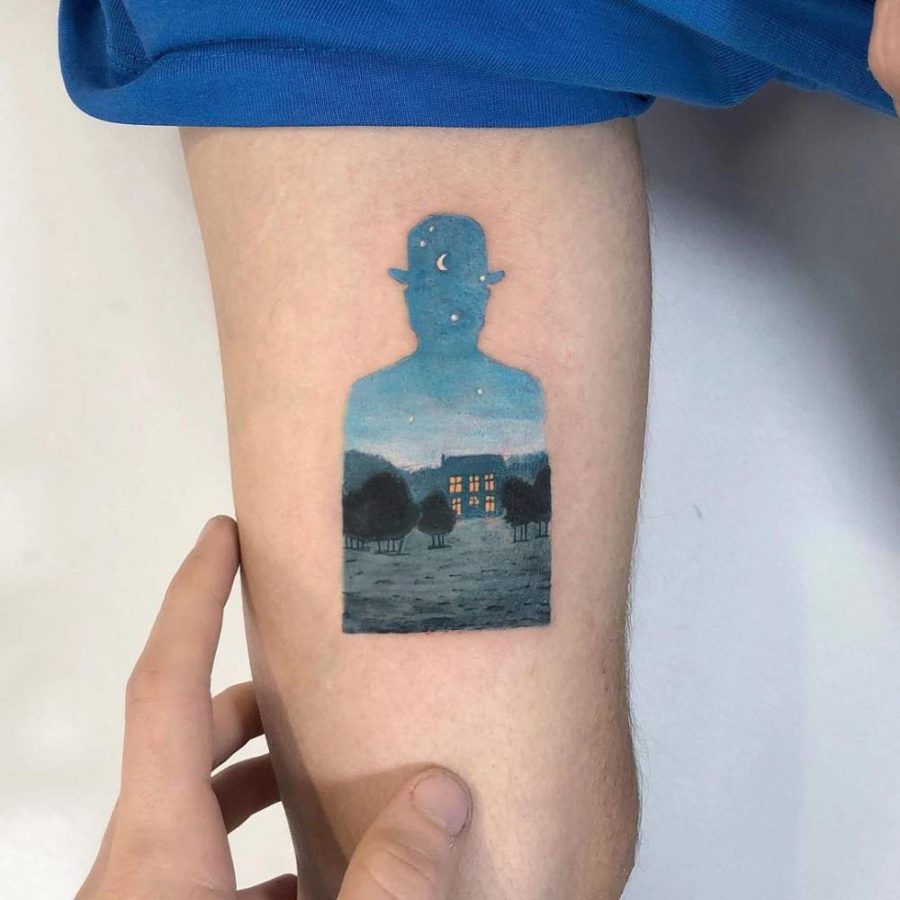
Surrealism is yet another endless source of inspiration. Granted Salvador Dali and his clocks take the cake, but the beautiful Happy Donor by René Magritte feels more attractive. Kozo Tattoo quite often seems to be looking for inspiration in art but also does not shy away from popular culture. Which in a way makes him similar to Magritte. Magritte was not only a famous painter, he also worked in advertising. He created multiple posters and was also responsible for graphic design for the Belgian Communist Party.

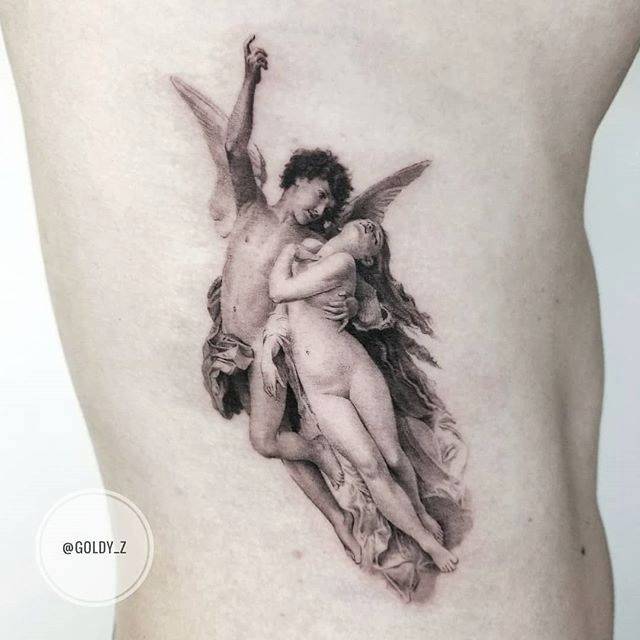
Zlata Kolomoyskaya specializes more in what you may call commemorative tattoos. These include portraits of famous people or people’s babies and favorite pets. Yet sometimes she also draws on art for inspiration. Here we can see a beautiful rendition of Cupid and Psyche by William-Adolphe Bouguereau. It took nine hours to complete, which is quite a long session.

William-Adolphe Bouguereau was a French academic painter. He was reviled by the Impressionists but loved by the public at the time. What endeared him to his patrons was not only his conservative style that felt safe and familiar but also his focus on female nudity. His works were often bought before they were completed. Also, many of them traveled to the United States. By the early twentieth century, Bouguereau and his art fell out of favor with the public due in part to changing tastes. In the 1980s a revival of interest in figure painting led to a rediscovery of Bouguereau and his work. Throughout his life, Bouguereau executed 822 known, finished paintings, although the whereabouts of many are still unknown.
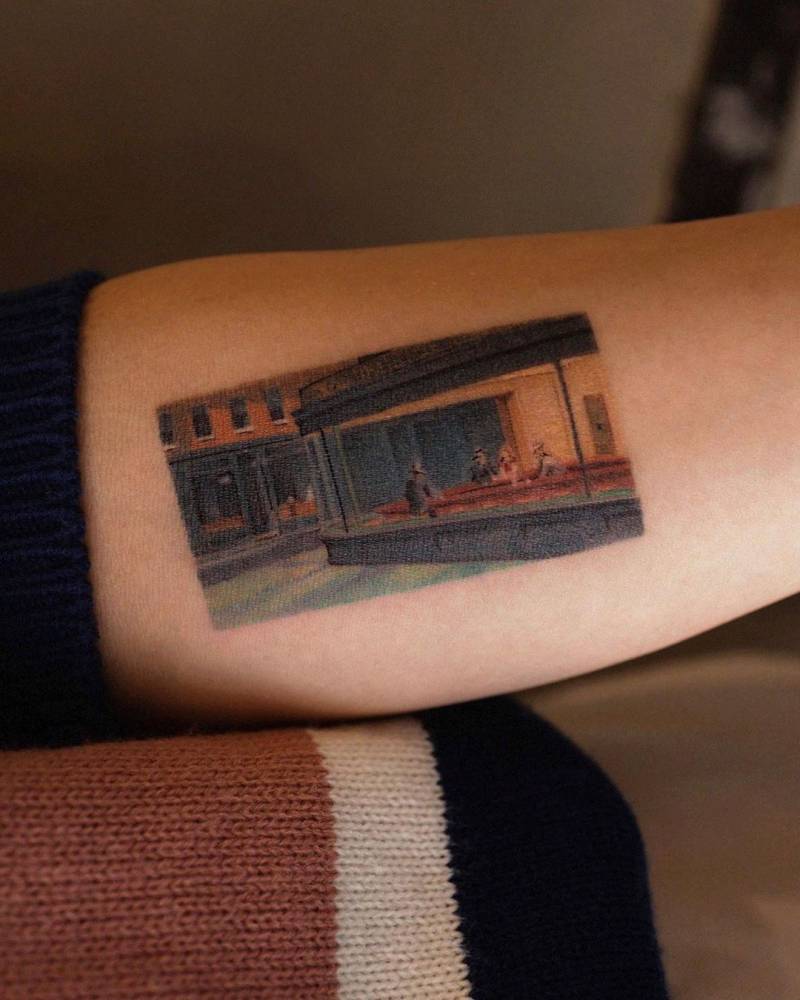
Now on to something a little bit more modern. The Nighthawks by Edward Hopper tattooed by Sol Tattoo. This is probably Hopper’s most famous painting, evoking the city’s loneliness like no other. Hopper’s wife, Josephine Division, was also a model for almost all the female figures in his paintings. She even helped to launch his career by suggesting his paintings be included in an exhibition she was invited to as well. Hopper’s career took a while to develop though. He only put on his first solo show at the age of 37. His House by the Railroad was the first painting acquired by the newly founded MoMA. It was also an inspiration for Hitchcock while creating the Bates hotel for Psycho. Given how Hopper’s paintings still resound with the age of city anxiety and isolation, why not have one on you?

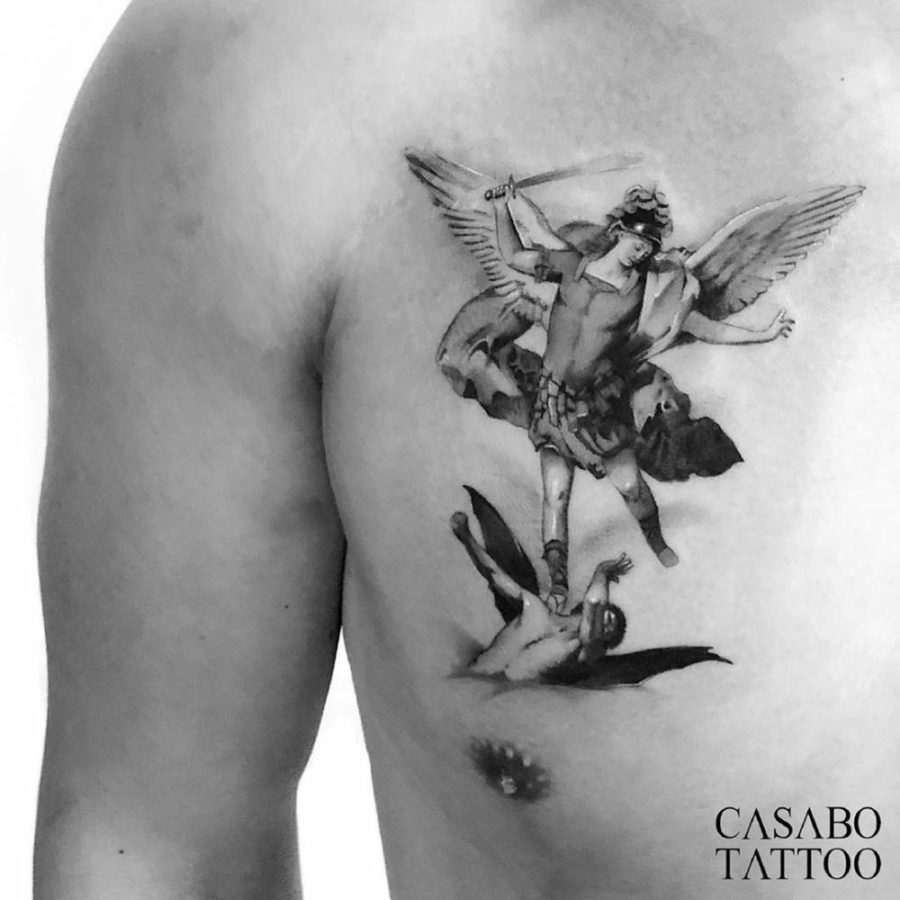
Now, if Hopper was a little too sedate for you let’s check out Luca Giordano. Here, in the tattoo by Ivan Casabo, we have The Fall of the Rebel Angels. Luca Giordano was an Italian Baroque painter. Born in Naples he worked in Rome, Bologna, Florence, as well as Madrid, and Toledo. Jusepe de Ribera trained him early in his career. Subsequently, he traveled to Rome for further training. Giordano was famous for the speed of his work; it even gained him the nickname “fa presto” (“doing fast”).

His paintings often have dramatic compositions. Giordano also boldly uses stark light and shade contrast to guide our eyes. His use of light is influenced by Caravaggio, whose paintings he must have at least seen in Naples. In this dramatic composition, Archangel Michael falls upon his enemies the doomed rebel angels, later to become devils. This elaborate composition makes Michael almost dance as the bodies of his opponents writhe in agony.
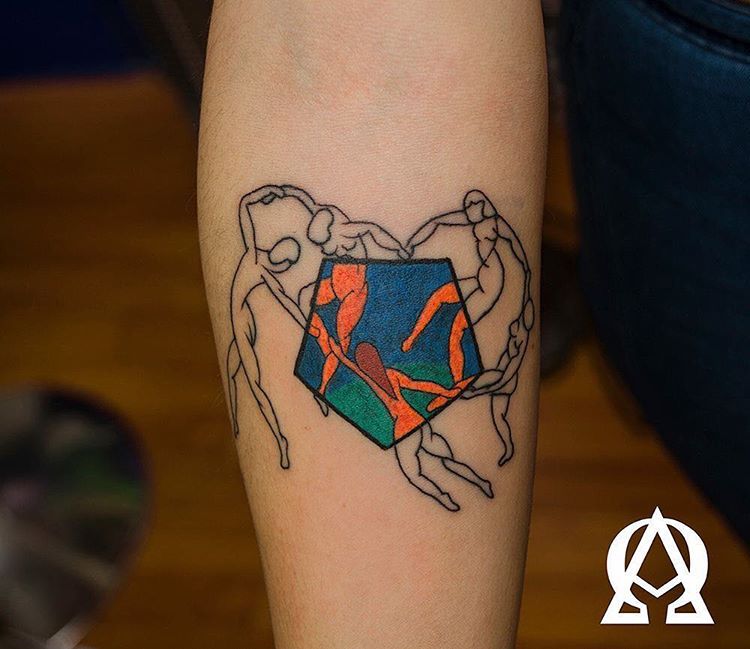
Since we’re on the topic of dance. The Dance by Henri Matisse is also inspiring for tattooists. Although quite rarely are all its vibrant colors rendered so vividly. Here we have an example of a compromised approach by Omegalfa Tattoo.
Henri Matisse did not set out to become a painter from the start. Actually, he studied law and passed his bar exam with distinction. An illness changed the course of his life. While he recovered from appendicitis his mother brought him art supplies to keep him entertained. That’s how he fell in love with painting. Another interesting thing is that he was a student at Académie Julian where one of his teachers was our friend William Bouguereau. Clearly, Matisse didn’t heed his advice in his career.
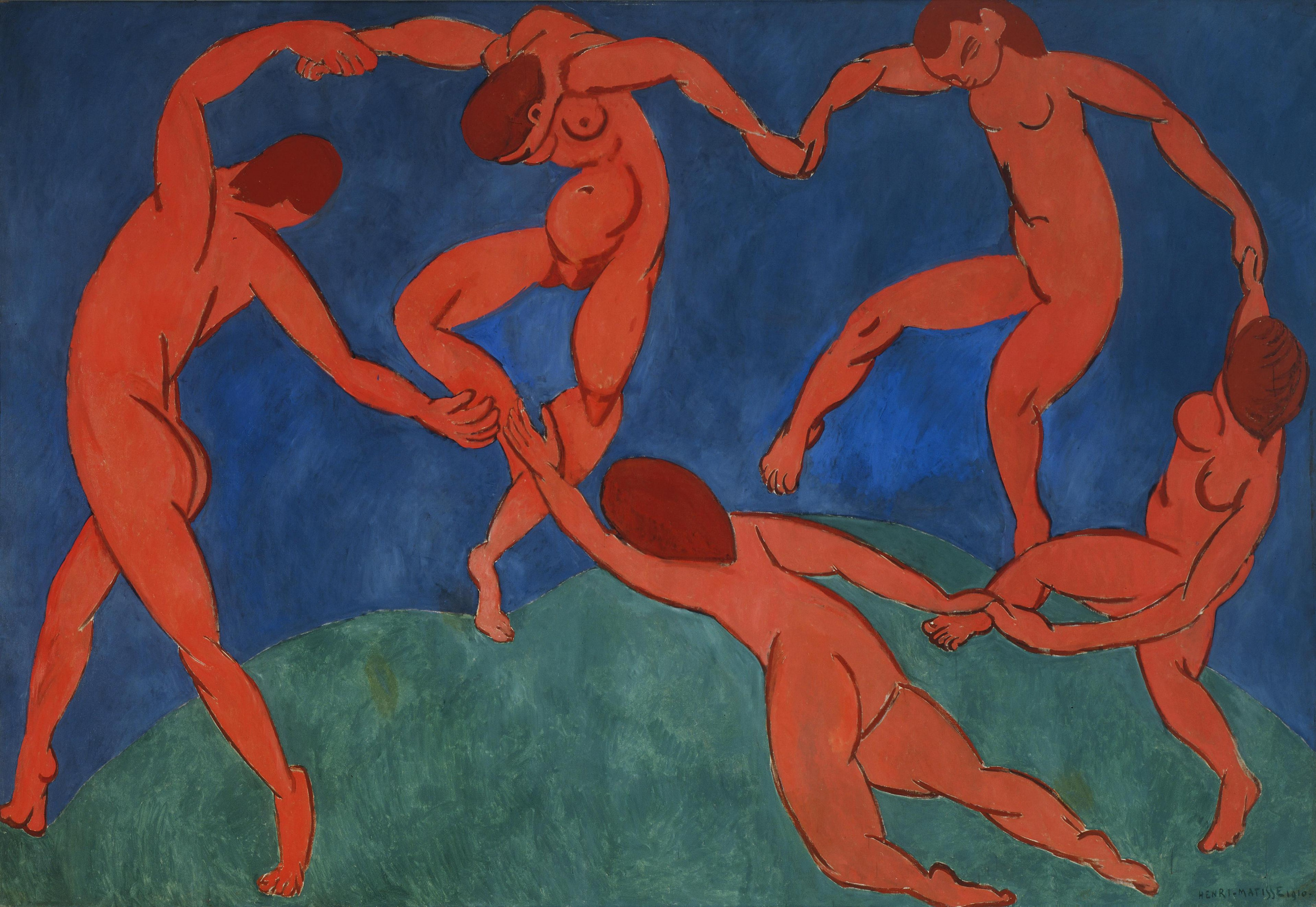
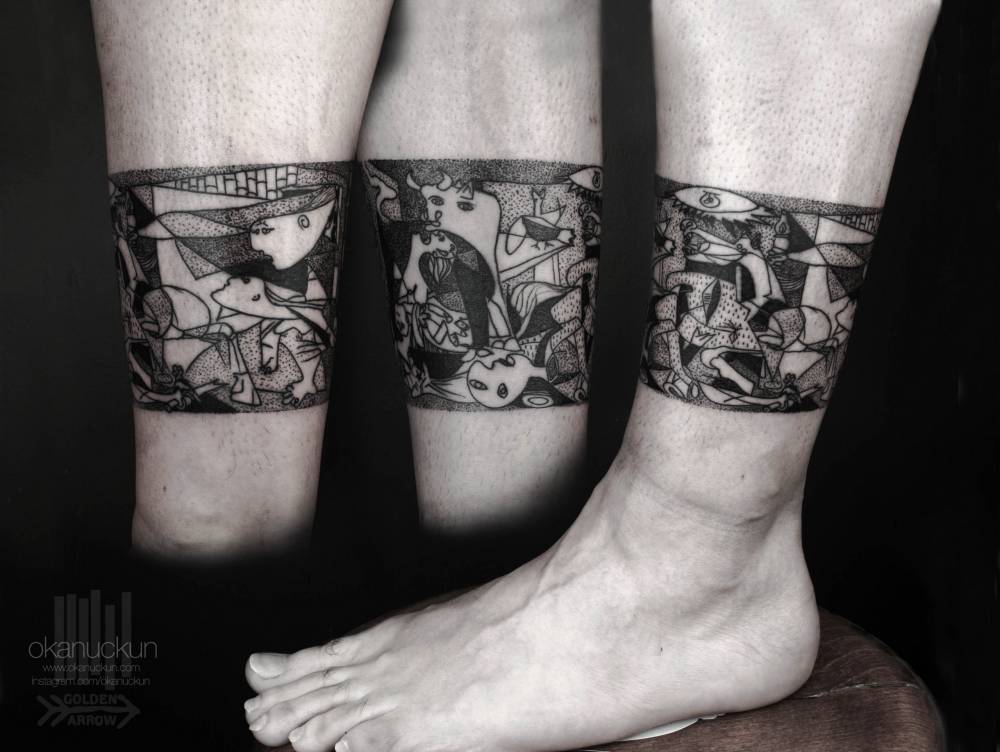
As much as The Dance was a celebration of pure joy, Pablo Picasso’s Guernica is a depiction of pure terror. Here is a beautiful ankle version by Okan Uckun. Uckun focuses generally on rather geometrical designs in his work. So Guernica seems to fit in quite well, even though it is significantly busier than his typical projects.

For Picasso, Guernica was not a typical painting either. As the 1937 World’s Fair approached members of Spain’s democratic government wanted the Spanish pavilion at Paris’ International Exposition Dedicated to Art and Technology to feature a mural that would expose the atrocities of Generalissimo Francisco Franco and his allies. For obvious reasons they selected Picasso. He did not experience the bombing of Guernica firsthand but read about it in a moving text by George Steer in The Times. Since the bombing took place in April 1937, Picasso did not have much time to complete such massive work. He began on May 1, 1937, approximately three weeks before the scheduled launch of the exhibit. Guernica was not completed until early June, about two weeks after the pavilion opened.
Would you pick any of the paintings above? Or do you already have something in mind for your next tattoo?
DailyArt Magazine needs your support. Every contribution, however big or small, is very valuable for our future. Thanks to it, we will be able to sustain and grow the Magazine. Thank you for your help!